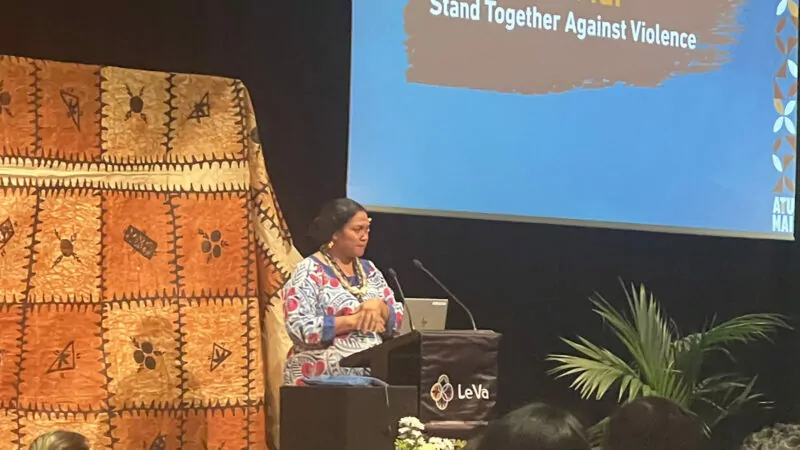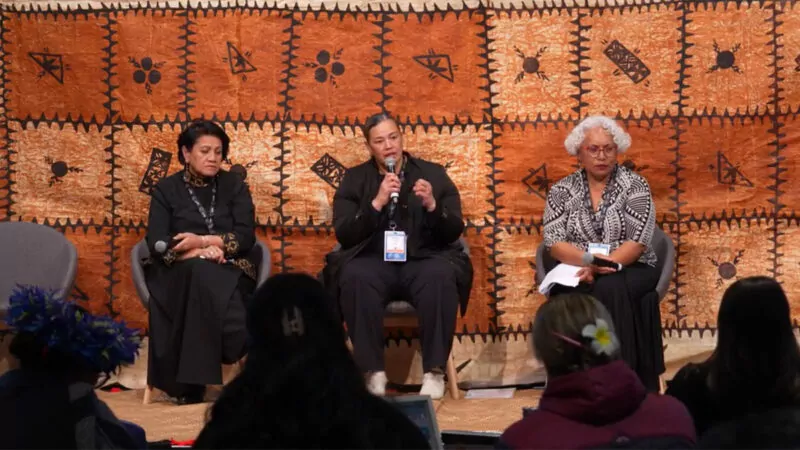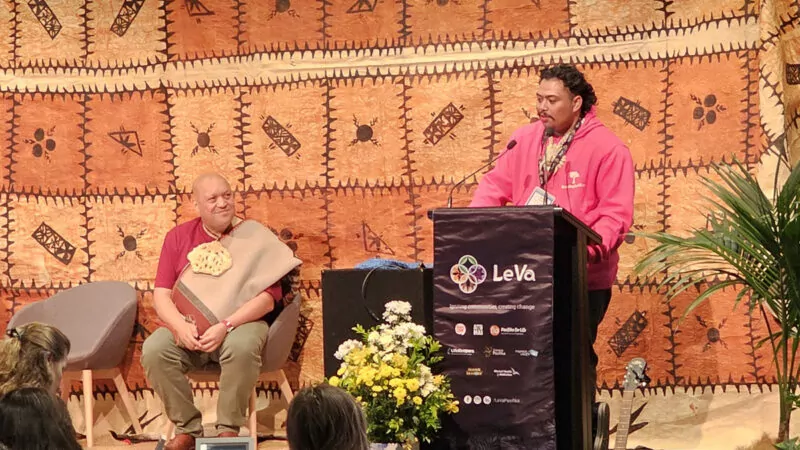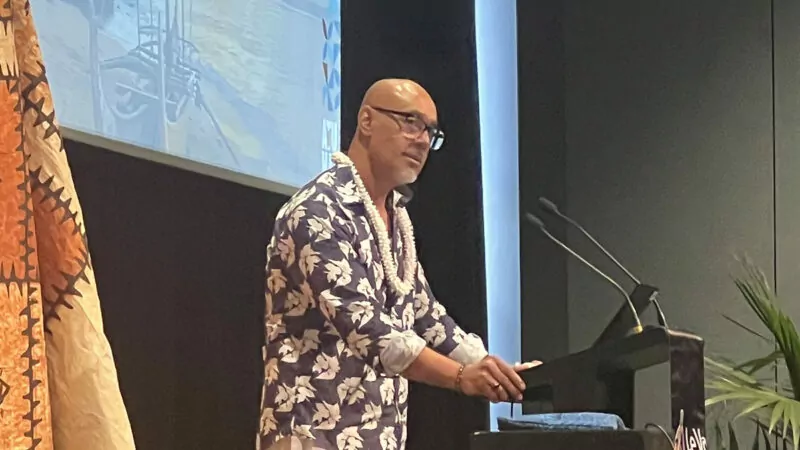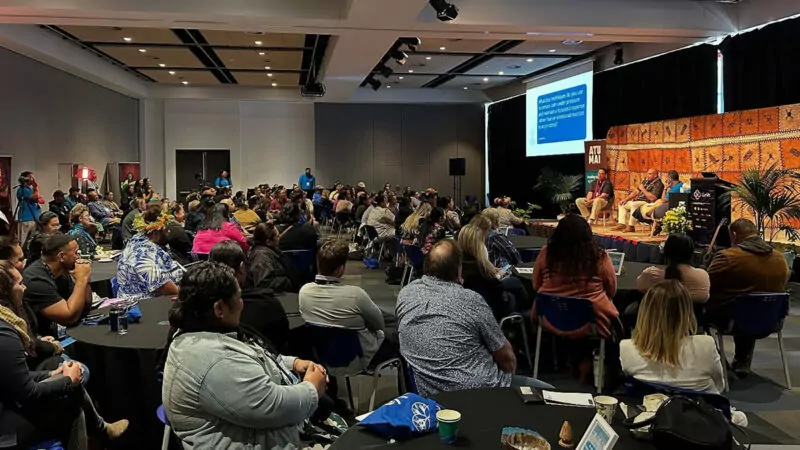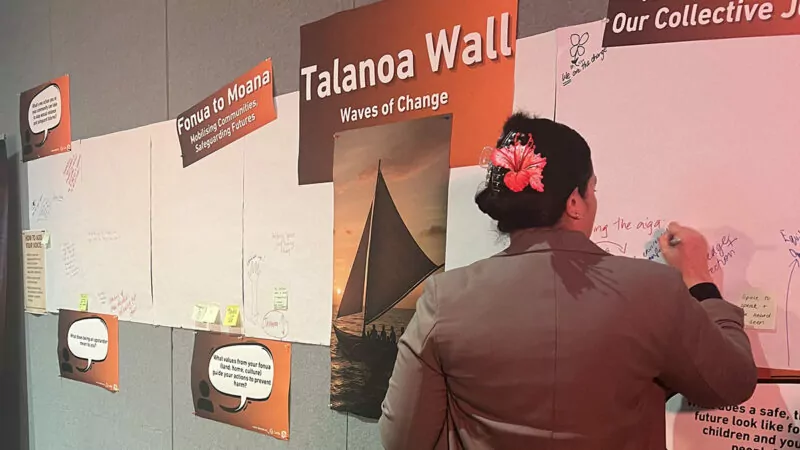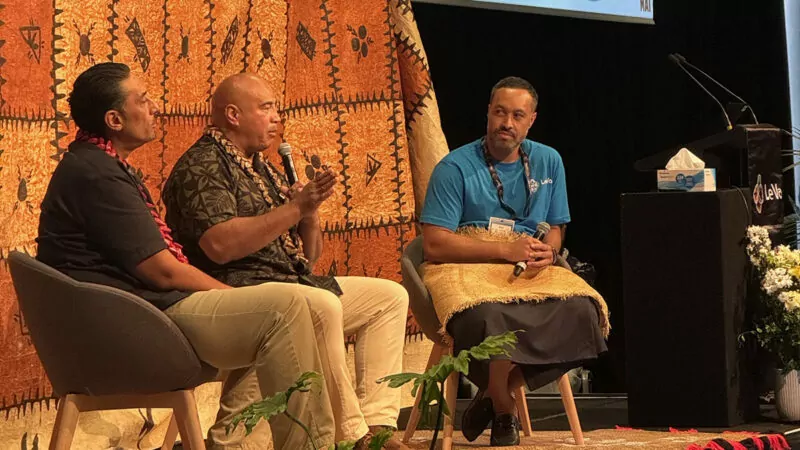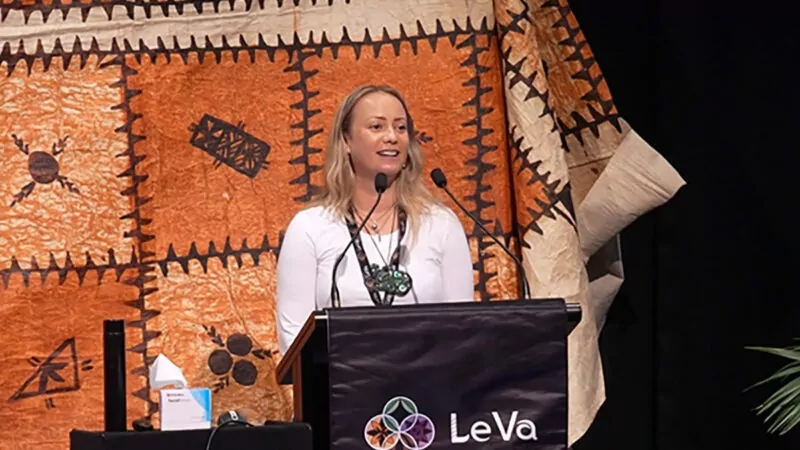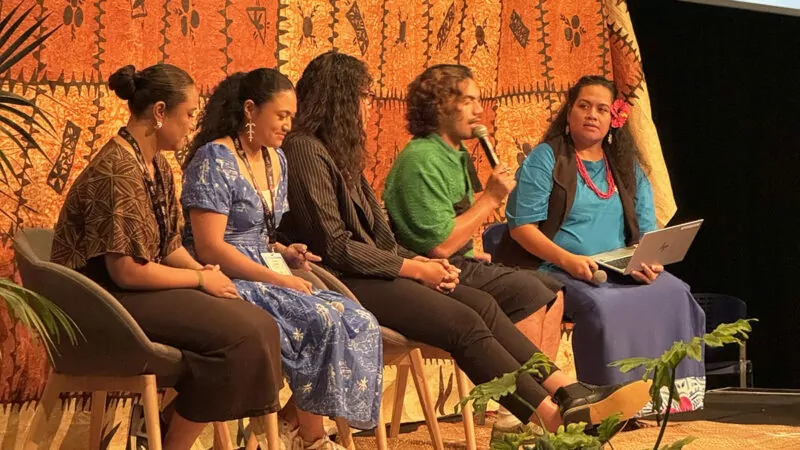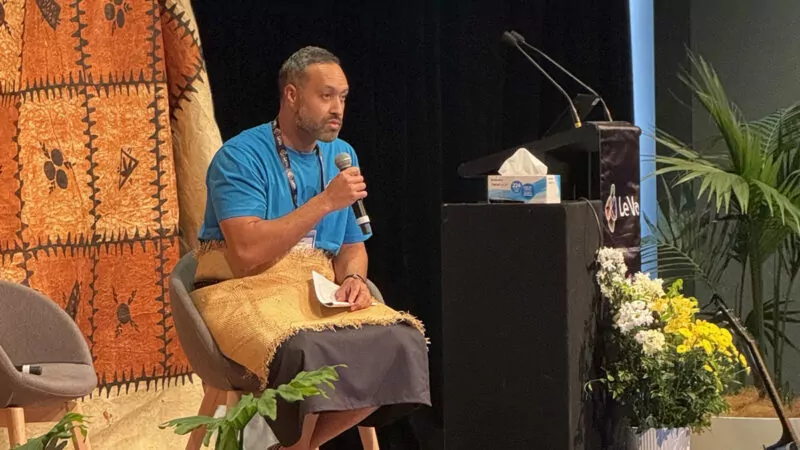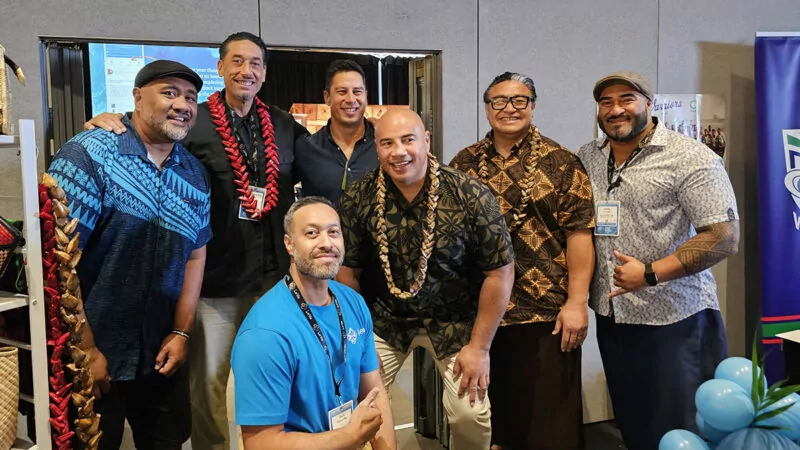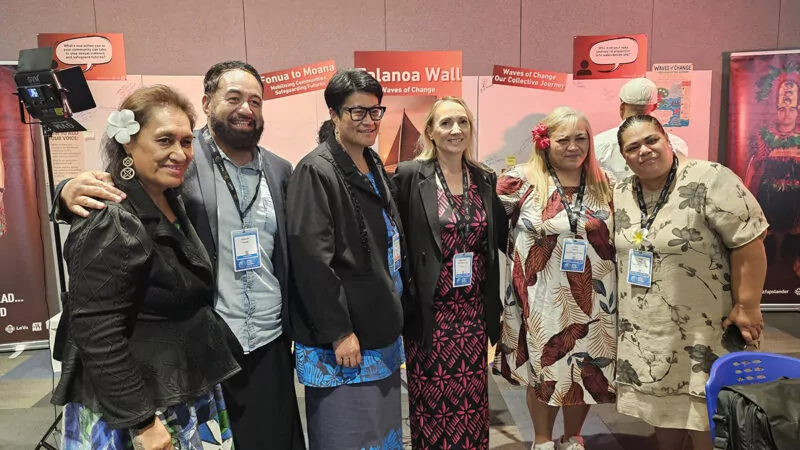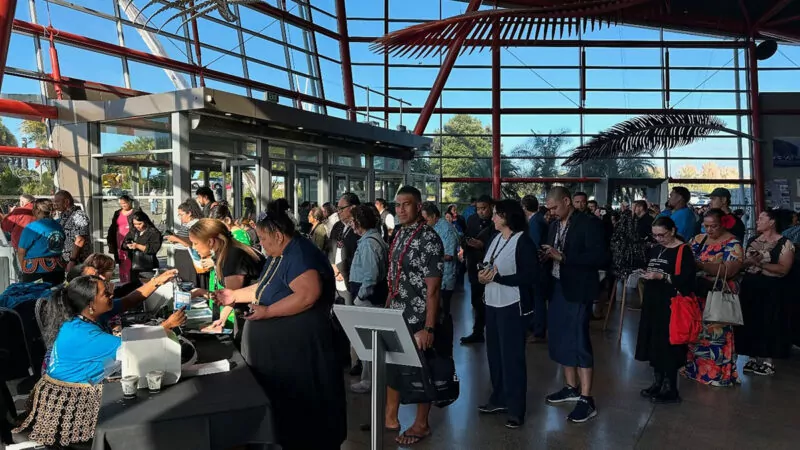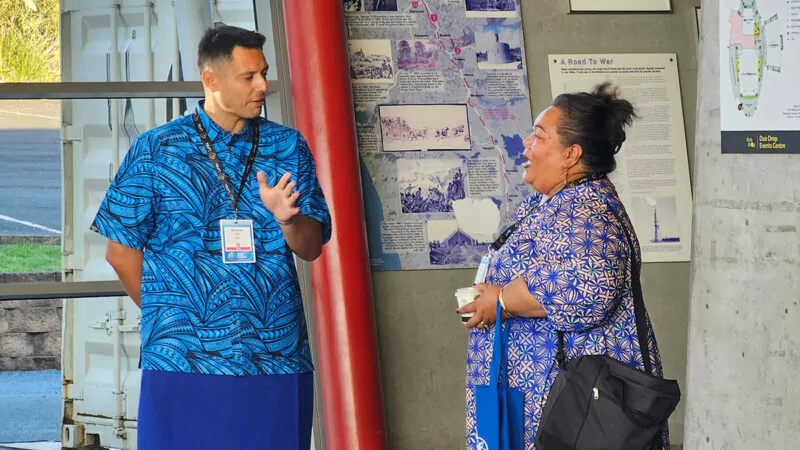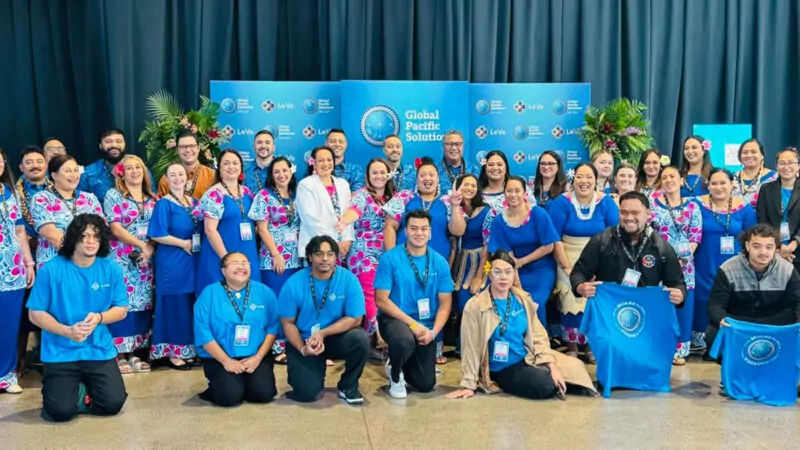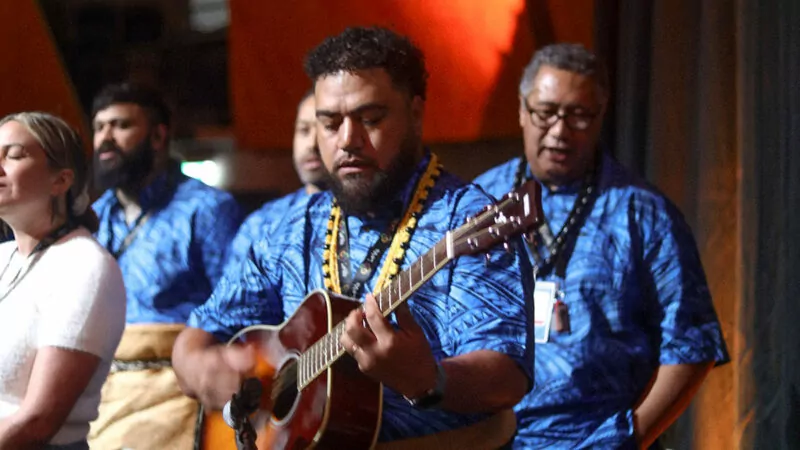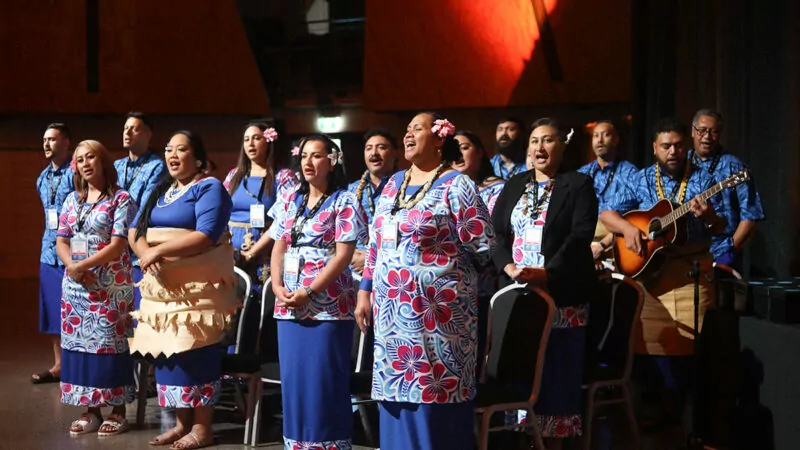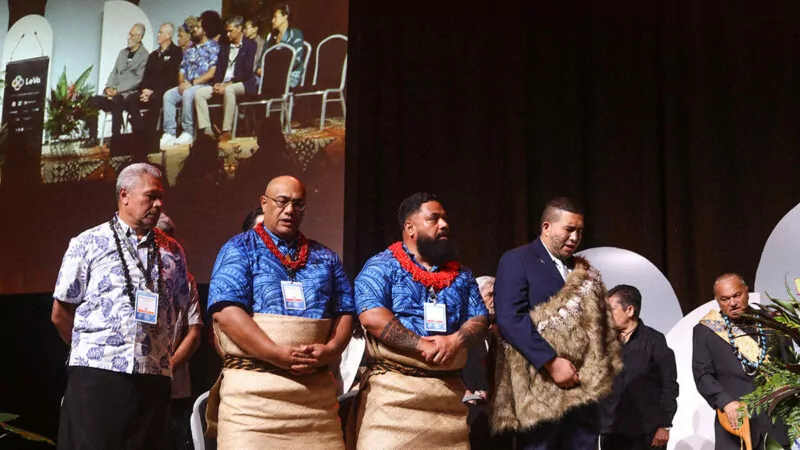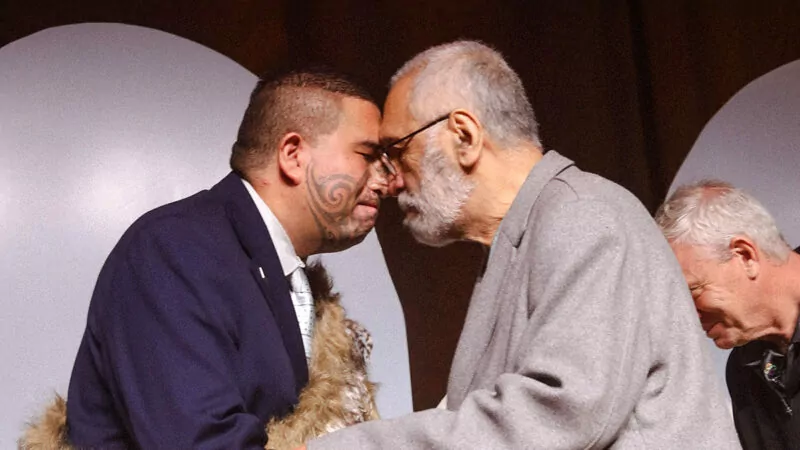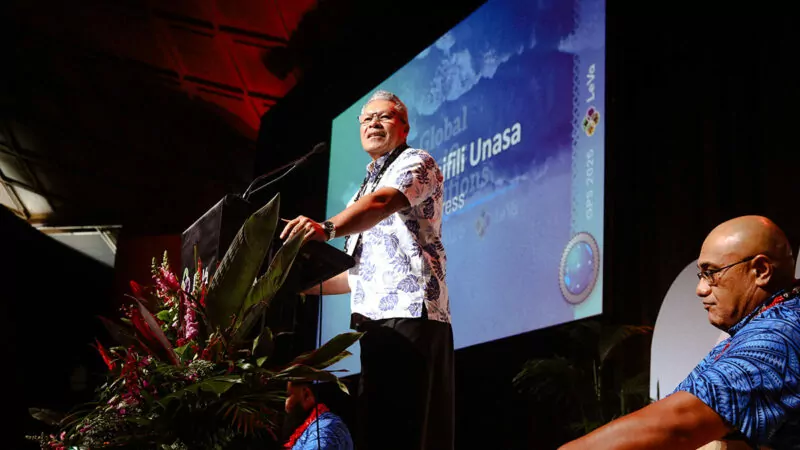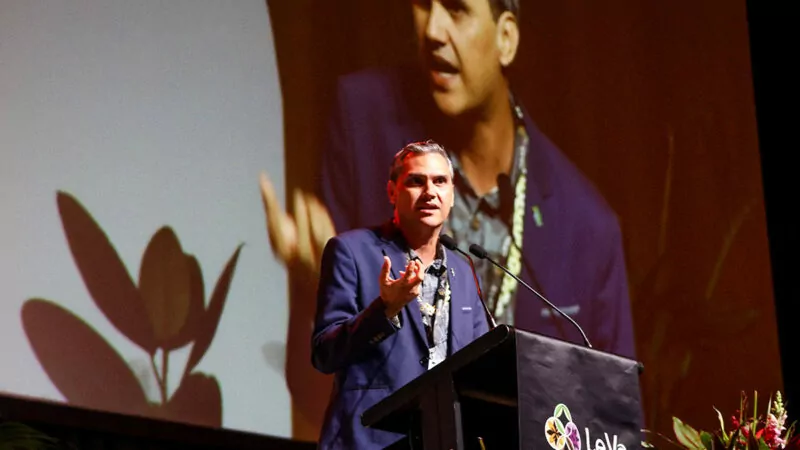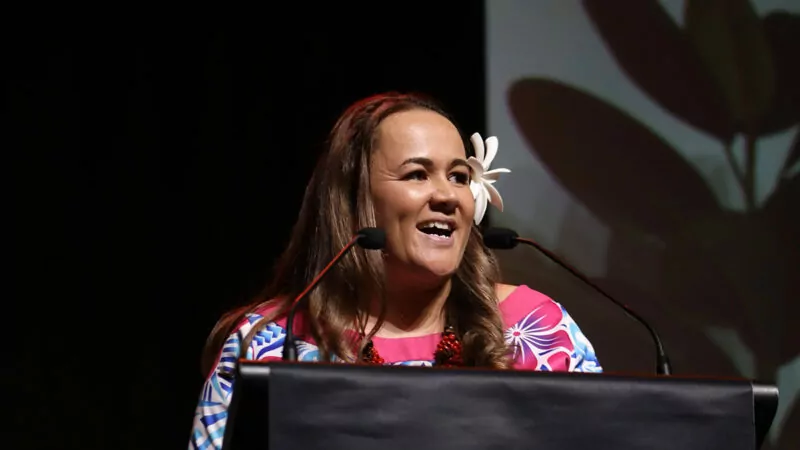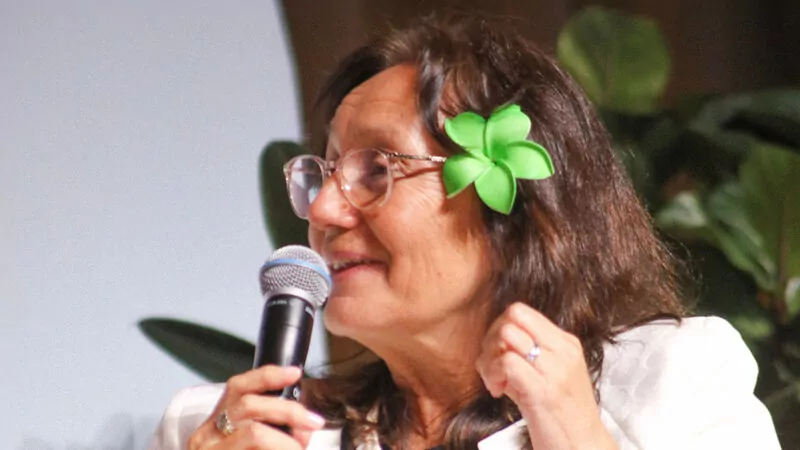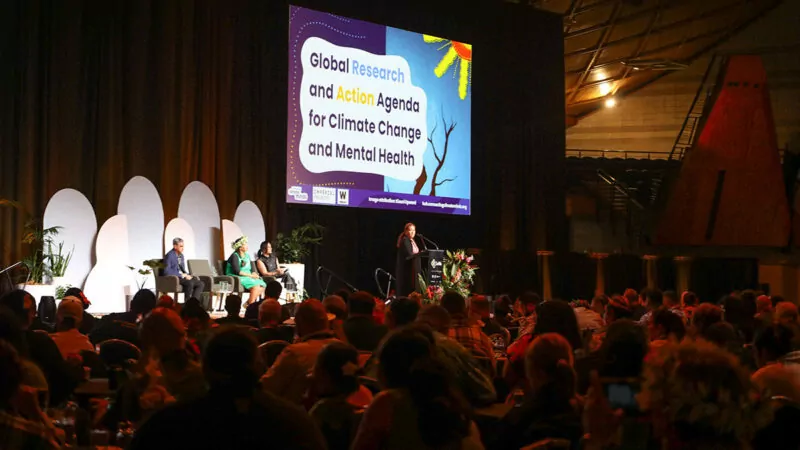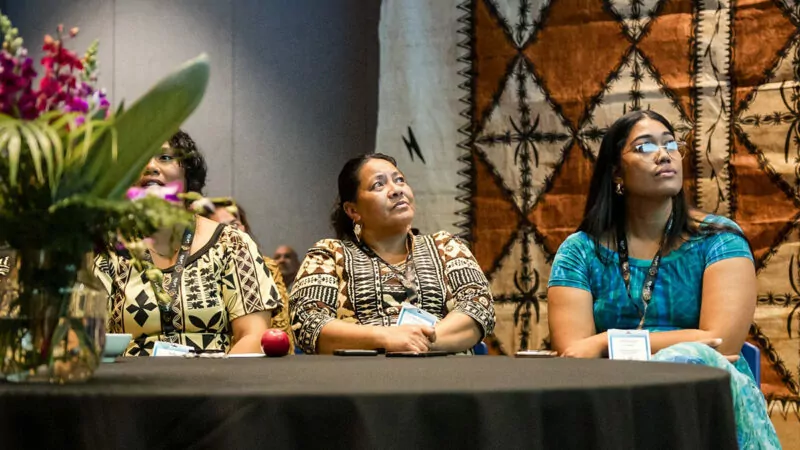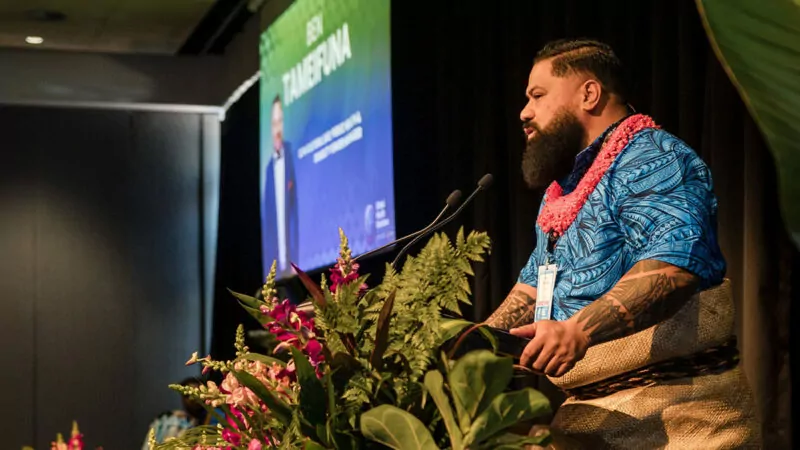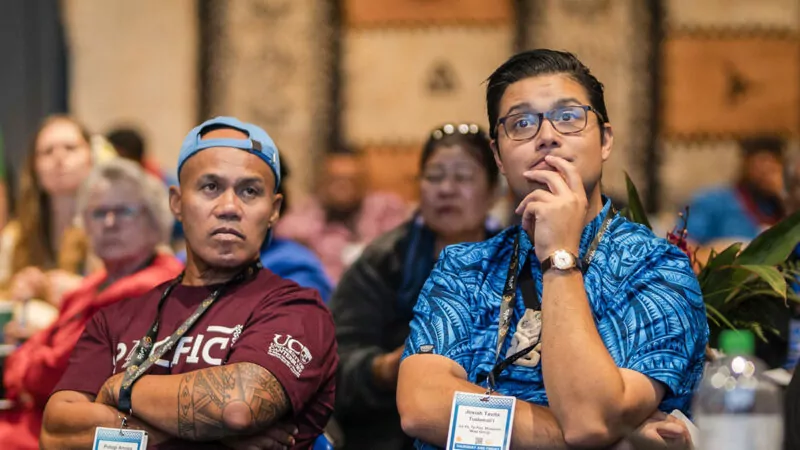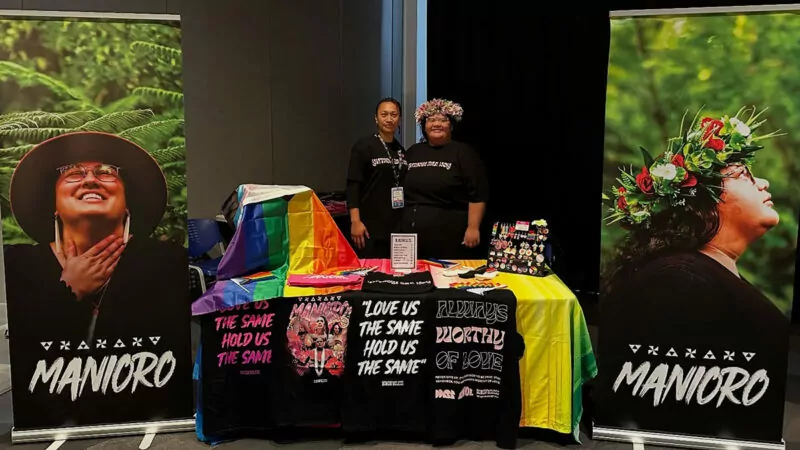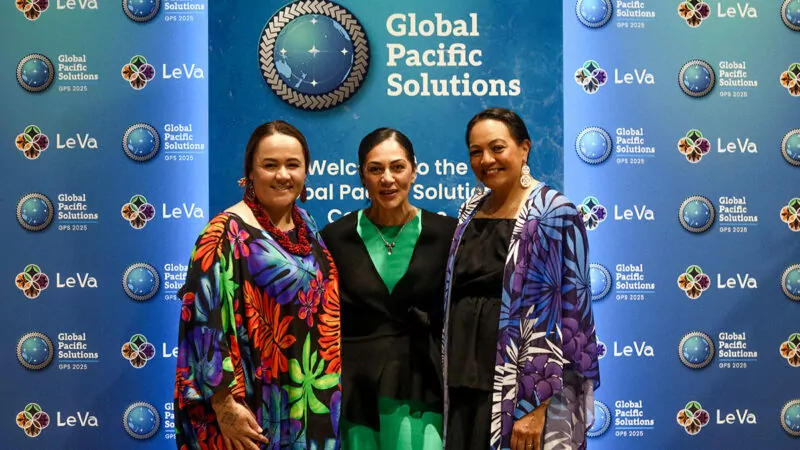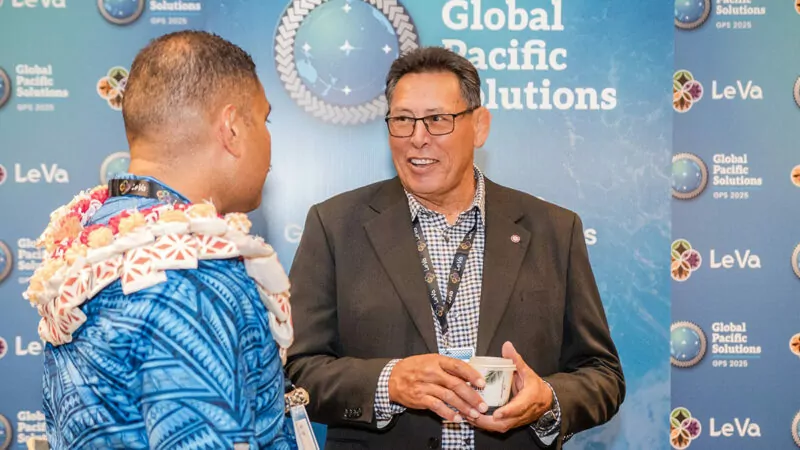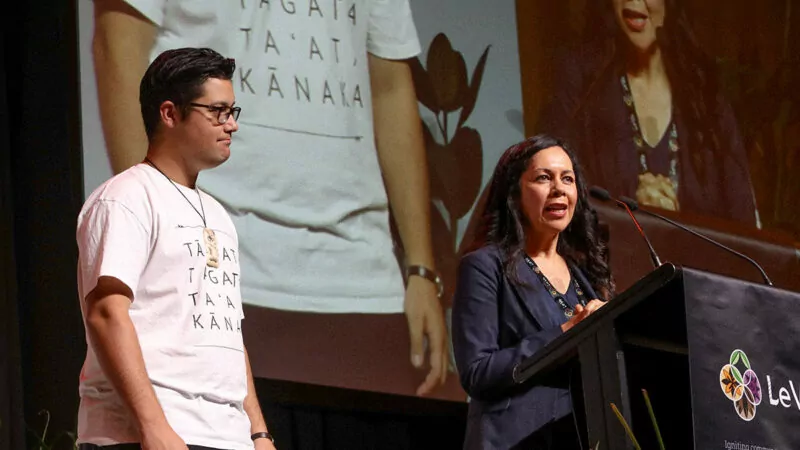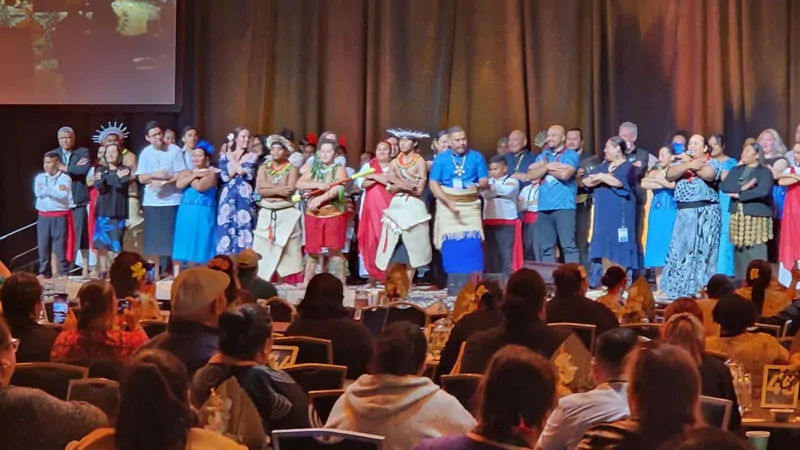Le Va’s Atu-Mai podcast series continues to gain traction with two more episodes due for release in June and July.
The podcast series for Atu-Mai highlights a series of guests to discuss topics such as sexual violence prevention and stopping child sexual abuse.
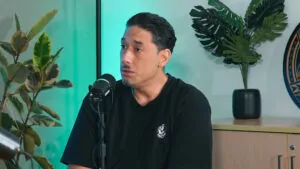
PJ King
Podcast guest Peter Jared (PJ) King is a basketball youth development advocate and founder of online forum, Kiwi Daddies.
PJ shares about his child sexual abuse in this podcast episode and says it was really important to talk about it. As a father, he says it was also important to be honest with his children.
“Knowing proper words for your body parts, knowing what sex is, giving them a proper explanation. And hey, that’s for when you are older, when you’re ready for it you know, it’s not for now.
“So, if anybody comes to you and tries to be that way then you let me know. They don’t have to let everyone know you just tell me please. Like, tell me as you father.
“I’m living proof that a boy can grow up in poverty and seeing sexual violence, to grow up to be someone else and take ownership of your story, good bad and ugly, and continue to heal. That’s the most gangster stuff you can do.”
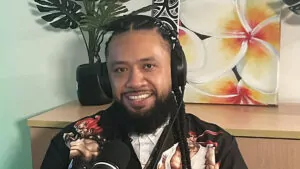
Matt Brown
Guest Matt Brown will share some valuable insights into his life experiences on his podcast episode, to be released in July.
“Thanks for the opportunity to speak here – such an honour but my heart is for our community,” he says.
“My message for them is to heal. Because to show up for yourself first, and then you can show up for your family, has to start with you. Your childhood trauma was not your fault, but your healing is absolutely your responsibility.”
The very first podcast episode was with Moeapulu Frances Tagaloa, who is a survivor of faith-based organisations who gave evidence at the Commission of Inquiry into Abuse.
Another episode features a conversation with two Methodist church ministers, Rev. Uesifili Unasa and Rev. Ikilifi Pope, talking about sexual violence prevention.
The Atu-Mai series was produced as part of ongoing efforts to reduce stigma, silence, and shame by talking about sexual violence, and to also help inform and equip people with tools to prevent it.
Atu-Mai says knowing systemic factors that contribute to sexual harm and discuss various risk and protective factors is very important too.
Listen now to the Le Va Podcast Atu-Mai series on Spotify or You Tube.
June marks the end of term for our current Atu-Mai community Upstanders following a season of trainings, workshops and community activations.
Le Va’s Atu-Mai violence prevention team engaged local leaders in the community to help educate and raise awareness about sexual violence prevention and stopping child sexual abuse, and has produced a series of Stories of Change to highlight their efforts.
Our busy team has continued to support each community mobiliser to run their exciting community activations, working in different spaces including events, men’s groups, schools, women’s refuge and churches.
Fale Pasifika Women’s Refuge Practice Lead, Sharee Sauni, says she wanted to be an Atu-Mai community mobiliser because there’s still more work to be done to change the thinking around sexual violence prevention – especially with the elderly and older generation.
“I want to find ways that I can raise awareness or normalise conversations with community, within our families, about sexual violence,” she says.
She has shared the Atu-Mai training with mothers and staff at her work.
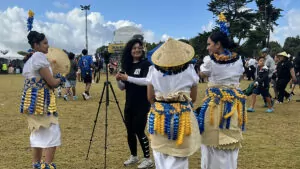
Pelea Fruean interviewing students at Polyfest 2025
Pelea Fruean, who interviewed people at Polyfest 2025 and during Le Va’s Global Pacific Solutions conference, said it was about breaking the stigma and silence for youth by having conversations.
“I really enjoyed the activation training I went through to be able to put me in a position to mobilise safely, and I think it’s helped me in my own personal relationships and even at work,” she says.
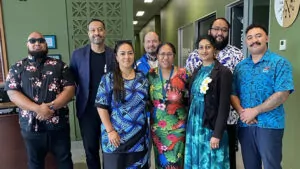
Aisina Olo-Tulaga with Deans from her school
South Auckland school counsellor, Aisina Olo-Tulaga, says being an Upstander was a great opportunity. She arranged for her school Deans to come to Le Va for an Atu-Mai training session.
“Building my kete of knowledge in child sexual abuse and prevention is really the key to preventing child sexual abuse,” she says.
And Josh Macfarlane from Man Alive says the Atu-Mai programme has had a lasting impact on his life and the lives of those around him.
“Transformative impact for me – massively yeah and I’m noticing the people that I work with it having an impact and it’s being taken home and actually being put in place – which has got to be transformative, hasn’t it?”, he says.
Our Atu-Mai primary prevention programme supports community mobilisation as a suitable way raise more awareness in the community about sexual violence and share about prevention measures in an effort to change attitudes, hearts and minds about a topic many Pasifika people find uncomfortable topic to even talk about.
The Fonua to Moana stream at Le Va’s 2025 Global Pacific Solutions conference provided a focused platform for advancing Pacific-led approaches to the primary prevention of sexual violence and child sexual abuse.
Grounded in Pacific values and knowledge systems and anchored in the theme “Mobilising Communities, Safeguarding Futures”, the stream brought together practitioners, youth, community leaders and system stakeholders to strengthen partnerships, challenge cultural silence and build sustainable solutions to protect tangata moana.
Day One
Day One focused on community-led action and systems-level change to prevent sexual violence. Sessions highlighted the power of cultural knowledge, the importance of supporting Māori and Pacific male survivors, and the need for stronger cross-sector collaboration. The day reinforced that prevention must be grounded in indigenous values, led by communities and supported by systems that are responsive and inclusive.
“Our communities already have the solutions, they just need support with systems and resources for them to mobilise and create change in their own communities.”
Ailupotea Taituuga Mirofora Mataafa-Komiti shared highlights from Le Va’s community mobilisation work alongside community Upstanders, focused on activating communities to engage in learning about healthy relationships, consent, sexual violence, child sexual abuse and positive parenting.
She launched Atu-Mai’s “Nurturing our Children” child sexual abuse prevention resources and emphasised Le Va’s approach, which ensures that all initiatives are culturally relevant, clinically safe and community led.
“The Bros need to see Bros in these spaces, so they feel seen.”
Dr Alexander Stevens II highlighted the unique risk factors and challenges experienced by Māori and Pacific men. He also emphasised the nuances and complexities of sexual violence experiences for men and boys who identify as Rainbow, people with disabilities and those of lower socio-economic status. As an advocate of mentoring the next generation of leaders, Dr Stevens II invited his student and mentee, Sione Finau to share his perspective and experiences as a young Pacific man navigating these spaces.
“We need to prioritise primary prevention and in all simplicity, that begins at home with our own children.”
The ‘Sexual Violence Sector and Systems’ panel, featuring Sylvia Yandall (HELP), Serena Curtis (MSD) and Liz Tanielu (Te Puna Aonui), explored how effective violence prevention requires recognising both strengths and gaps within current systems.
The panellists emphasised that prevention must be a shared responsibility across all levels of the system, with cultural knowledge positioned not as an add-on, but as essential infrastructure for sustainable, community-led change.
Day Two
“It is our responsibility to role model what healthy masculinity looks both on and off the field. Make our boys know that it is okay to not be okay. There is no judgement.”
‘Growing Men Who Are Upstanders’ was a session that explored the influential role of men, particularly within sports, in shaping and sustaining healthy gender norms. Jerry Seuseu (NZRL, Wellbeing Manger) and PJ King (Basketball Foundation Limited, Director) addressed how culturally grounded models of masculinity, rooted in values such as alofa (love), fa’aaloalo (respect) and tautua (service) can be powerful tools in challenging harmful norms and promoting protective behaviours.
By moving away from the expectation to “harden up” and positioning men as key allies, the stream contributed to a shift towards normalising vulnerability as strength and supporting the emotional wellbeing of young men as an essential part of violence prevention.
“Our communities hold the solution. We need to engage and get them involved as they know what works best for them.”
Dr Jade Le Grice delivered a compelling kōrero on the importance of reclaiming Māori understandings of sexuality, wellbeing and safety as essential to preventing sexual violence. Framing the conversation through tikanga and mātauranga Māori, she explored how traditional concepts such as ‘tapu’ and ‘noa’ offer culturally rooted protective factors, and the impact of colonial disruption on current experiences of harm. She called for prevention approaches that centre Indigenous knowledge, strengthen whānau-led solutions and restore balance through cultural reconnection.
“Youth are not waiting for tomorrow, they are already out there leading and influencing change for our people. As parents and elder, you just need to give us the space to thrive.”
Our youth-led panel brought powerful insight and honesty to the forefront of the violence prevention conversation. Pelea Fruean, Kasi Valu, Mariner Fagaiva and Nele Kalolo shared the realities of navigating consent, identity and relationships while confronting silence, stigma and outdated norms. They called for open, intergenerational dialogue and safer spaces where young people can speak and be heard without fear or shame.
Their messages were clear: prevention starts with honest conversation; culture must evolve to protect rather than silence; and being an upstander is not just a role, it’s a responsibility. This session reinforced that young Pacific leaders are not waiting for permission to lead change, they are already doing it.
Over two impactful days in April, around 700 people joined together at the Due Drop Events Centre in Manukau for Le Va’s Global Pacific Solutions 2025 conference – uniting Pacific leaders, academics, international guest speakers, workforce and community members in a tour de force of strengths-based solution seeking.
Bringing to light tough topics such as child trafficking, suicide prevention, climate change, child sexual abuse, equity for disabled people and the ever-growing demand for mental health and addiction support workers, GPS 2025 was an event that opened minds, challenged the status quo and inspired hope for all who attended.
At times, the audience was moved to tears upon hearing transformative stories of overcoming adversity, fighting for justice and connecting to culture in a way that enhances our true selves.
Inspirational plenary speakers and breakout presenters communicated passionately, sharing their expertise to advance the knowledge of all who listened.
When opening the ‘Nurturing our Children’ plenary panel at GPS 2025, Le Va’s chief executive, Denise Kingi-‘Ulu’ave, said, “It is both an honour and a solemn responsibility to welcome you to today’s panel discussion on child sexual abuse and child trafficking across the wider Pacific.
“This is a conversation that demands our full attention, our collective expertise and most importantly, our unwavering commitment to action.
“The Pacific is home to diverse and resilient communities, but it is not immune to the global crises of child sexual exploitation and trafficking.”
We know that the solutions lie within our communities – GPS 2025 was an opportunity to bring together into one space the hearts, spirits and minds of hundreds of people, all eager to ignite change and promote the power of Indigenous intelligence.
Over the coming weeks, Le Va will be sharing many of the insights and solutions that were explored throughout Global Pacific Solutions 2025, with gratitude to everyone who was present and contributed to this important kaupapa.
Please subscribe to our eNewsletter to learn more: www.leva.co.nz/subscribe
Ake Felix and Holly Walmsley support Le Va’s Atu-Mai Upstander movement to help raise awareness about preventing sexual violence and child sexual abuse, especially in Pasifika communities.
“I was interested in being an Upstander because, like I say in our culture, it can be quite a taboo topic to discuss,” says Ake, who is of Samoan and Māori descent.
“I wanted to be part of that shift by building that space to have the knowledge and confidence to speak about these topics and understand it is not a taboo topic, and it can be normalised, and people can feel confident speaking about sexual abuse and sex in general and helping and assisting other people in their families as well,” she says.
Holly, whose career has largely been in the sexual harm space so far, is a huge fan of Le Va’s programmes.
“Oh, I love Le Va, and I did the LifeKeepers [suicide prevention] course and thought it was awesome and thought this is going to be cool, I just know it.
“You really want to prevent it from happening in the first place – I mean there’s a lot of amazing work being done in this space and I’m excited to be in the prevention space with all these awesome people.”
Both women work as Community Health Promoters for Sexual Wellbeing Aotearoa and both are interested and supportive of the work Le Va’s Atu-Mai team is doing in the primary prevention space. Upstander Ake is also keen to engage the Pacific community more.
“I’d love through this mahi to engage our community in these types of talanoa, through workshops and social platforms as well,” says Ake who also wants resources to be easier to access by community as well.
She says it’s also about changing perspectives.
“One of the goals for me is to give the tools maybe our parents and generation before did not have,” says Ake.
“And setting up the scene to build new paths for others in the community to take steps as well.”
Le Va’s Atu-Mai Upstanders have begun their next wave of innovative community mobilisation activations, working to prevent sexual violence in different spaces including schools, community organisations, clubs and churches across Tāmaki Makaurau Auckland.
Community leaders, trained through the Atu-Mai Upstander programme, are delivering workshops and hosting talanoa (conversations) in their communities to raise awareness for the prevention of sexual harm.
Their activities cover topics like building healthy relationships, understanding boundaries and consent, and creating healthy gender norms.
Le Va’s senior manager for violence prevention, Paul Tupou-Vea, says he is proud to see community leaders breaking the silence around topics related to sexual violence.
“Traditionally there are cultural barriers that make it uncomfortable to talanoa about sexual harm or sexual safety,” he says.
“That makes it all the more important and powerful when we start to shine the light on these issues.”
The Atu-Mai team held several sexual violence prevention training sessions in 2024 to share knowledge about the causes, risks and protective factors of sexual harm in our communities, focusing on how we can all work together to bring about change.
Le Va’s Atu-Mai community engagement leads have been working alongside to support our Upstanders.
One of the leads, Charles Lavea, says his work with men and fathers has helped, especially when it comes to healthy masculinity norms.
“Men and fathers having a safe space to talanoa openly is a powerful step towards transformation,” he says.
Charles added that when men feel safe to share, reflect and challenge harmful norms without fear of judgement, that’s when real change starts to take place.
“By strengthening leaders’ capabilities, we create environments where respect, consent, and positive masculinity become the norm,” he says.
Mental healthcare in Aotearoa New Zealand is at a crossroads, and Le Va is calling attention to the urgent need for change, with a focus on mental ill-health prevention and mental wellbeing promotion alongside early intervention and recovery support.
In spite of increased government investment and better access to support over the last few decades, more people than ever are experiencing mental health challenges, with high rates of suicide, addiction and mental illness.
Dr Stephen Carbone has a passion for promoting people’s mental wellbeing. The founder and former CEO of Prevention United in Australia visited Pasifika-led organisation Le Va in March to speak about the important role primary prevention has in mental health policy.
Senior executives from across the social and healthcare sectors in Aotearoa New Zealand attended an in-person hui and online webinar, to learn more about what primary prevention is and how it can be a crucial complement to existing mental healthcare services.
Dr Carbone spoke about the effectiveness of mental wellbeing promotion and prevention of mental health conditions as a two-pronged tactic to help reduce the number of people who develop depression, anxiety or substance use conditions.
He said, “Mental health conditions are distressing, potentially disabling and contribute to death by suicide. While efforts to provide better treatments and services are important, there is more that we can do.”
Dr Carbone explained that while effective treatments are now more widely available and used, the number of people affected by conditions like depression and anxiety continues to rise in both Australia and New Zealand.
Ultimately, supporting people’s mental wellbeing and preventing the onset of mental health conditions at a population health level, would likely lead to less pressure on an already over-burdened mental healthcare system in Aotearoa.
Le Va chief executive, Denise Kingi-‘Ulu’ave, said of Dr Carbone’s visit, “We are grateful to Stephen for generously sharing his expertise in the field of primary prevention, an approach that underpins almost everything we do at Le Va.
“We want to keep this conversation going with the leaders of our healthcare systems, so we can develop a shared collective approach to primary prevention to benefit the people we serve.”
Adopting a primary prevention approach for mental health means not waiting until people are unwell before taking action, as is already common for physical health conditions like diabetes or heart disease.
At Le Va we believe this is the way forward for the prevention of serious issues such as mental illness, sexual violence, addiction and suicide.
Le Va’s Atu-Mai violence prevention team was excited to launch Le Va’s first podcast this March, with an initial series focusing on sexual violence prevention.
Offering fresh dynamic conversations with carefully selected guests, the Atu-Mai programme’s podcast episodes focus on discussions with survivors, advocates and experts who are all working towards ending sexual violence and child sexual abuse.
This first podcast series explores systemic factors that contribute to sexual harm, and emphasises the importance of community and robust systems when it comes to prevention.
It also highlights how understanding risk and protective factors for sexual violence prevention is key.
The first episode features Moeapulu Frances Tagaloa and her husband Timo Tagaloa.

Timo Tagaloa, Moeapulu Frances Tagaloa, Sara Vui-Talitu, Paul Tupou-Vea
Frances is a survivor of child sexual abuse in a faith care organisation and her talanoa during the podcast, with her husband in support, is emotional, honest and courageous.
“Just years navigating life and trauma, dealing with life and how do I deal with trusting people. If I’d never been abused, I might have developed into someone quite different,” says Frances.
“It’s a loss I feel quite closely. A loss of a childhood, a loss of happiness and joy that could have been there. The impact of abuse is for a lifetime.”
For a long time, Frances was reluctant to share her story, but the Abuse in Care Commission of Inquiry changed all of that.
“When abuse happens, that vā needs to be put right and for me part of that is speaking up for survivors and part of it for me is wanting to obtain an apology.”
Frances is also keen to have a better system of redress when people are harmed and says this government can do a lot more to bring about change.
Episode two of the podcast, which will be released soon, sees the team interview two church ministers about child sexual abuse prevention in the context of faith and following God.

Taitu’uga Mirofora Mataafa-Komiti, Sonia Pope, Rev. Ikifili Pope, Rev. Uesifili Unasa
One minister is our Le Va matua and board member, Reverend Uesifili Unasa, who says many Pacific people have been brought up in a system where there is a hierarchy and an authority that are important.
“You listen to those above us and so, when our children are put in a place where they have a low status, the authority system means that they have no voice, they have no say, no position as it were to challenge the way things are, to answer back to something they know is wrong, because our system trains us in our hierarchical cultural ways [that] authority is really important and sacrosanct,” he says.
The Le Va podcast aims to talk about tough topics like violence prevention while ensuring our listeners are kept informed, that what they are hearing is clinically safe, and to help equip people with tools to support them.
This Atu-Mai series of the Le Va podcast was produced as part of ongoing efforts to reduce the stigma, silence and shame by having open and honest discussions about sexual violence.
Listen to the Le Va podcast on Spotify or YouTube.
Le Va’s Atu-Mai team was fortunate to have a professional development session with violence prevention expert Prof. Janet Fanslow this month.
Prof. Fanslow is a Professor at the School of Population Health, University of Auckland, and her research focuses on the prevention, prevalence and consequences of family violence in Aotearoa New Zealand.
She said she had heard positive things about Le Va and its community mobilisation focused Atu-Mai programme that is part of a much wider system of change for violence prevention work.
Taituuga Mirofora Mataafa-Komiti, primary prevention manager for Atu-Mai, found Janet’s presentation insightful.
“I appreciated the different frameworks Prof. Fanslow presented, as well as the global initiatives she highlighted, which broadened my perspective on violence prevention,” she said.
“I especially liked how she challenged us to ask critical questions, offering an opportunity for individuals to reflect on their own experiences and the wider impact of violence.”

Prof. Janet Fanslow
Prof. Fanslow considers a range of risk and protective factors in her research, including economic, physical and emotional abuse that can be contributing factors to violence.
She travels the globe representing Aotearoa at international conferences, and led the 2003 and 2019 New Zealand Violence Against Women Surveys.
Her work has also received funding from the Health Research Council of New Zealand.
Learn more about Le Va’s violence prevention work.
Le Va is breaking the silence surrounding child sexual abuse (CSA) with new resources to help community upstanders prevent sexual violence in Pasifika communities.
The series of online resources, developed by Le Va’s Atu-Mai violence prevention team, will cover topics such as Pasifika Values, Talanoa to Protect, Protecting our Pasifika Children, Knowing Who is in Your Village, and Be Courageous and Act.
Dr Elizabeth Mati, Le Va’s general manager who is also a clinical psychologist, and Atu-Mai primary prevention manager, Taituuga Mataafa-Komiti, spearheaded a year-long community engagement initiative to explore how we can help prevent CSA within Pasifika communities in Aotearoa.

Dr Elizabeth Mati presenting at the 2024 TOAH-NNEST sexual violence conference
“We need to stop the silence and start talking about child sexual abuse to protect our children. These resources are the first step in our journey towards supporting our families and communities to address child sexual abuse,” Dr Mati said.
“We know these resources will help Pasifika parents in particular to stay vigilant and learn to identify the signs of potential harm to our children.”
For many Pasifika people, topics related to sex or sexual harm are viewed as too taboo to discuss openly. Le Va’s co-development of resources forms part of ongoing efforts to help Pasifika communities identify and stop child sexual abuse.
“Sexual violence is an uncomfortable topic, but it has significant, ongoing impacts on our communities,” said Paul Tupou-Vea, senior manager – violence prevention for the Atu-Mai programme.
“There aren’t enough Pacific-specific resources, so we hope these resources help our communities in a culturally sensitive way.”
The collaborative effort brought together representatives from various sectors and Pasifika community groups, including faith leaders, educators, parents, subject matter experts, youth and members of the Rainbow and disability communities.
All of their insights and contributions helped to shape the development of educational resources for parents and caregivers.
Le Va released the first of these resources in November to coincide with Dr Mati’s presentation – ‘Nurturing our Children: Prevention of Child Sexual Abuse in Pasifika Communities: Insights from the Atu-Mai programme’ – at the 2024 TOAH-NNEST National Sexual Violence Conference in Christchurch.
Learn more about our Nurturing our children resources.

Te Tāmata Tipu – TOAH-NNEST conference
